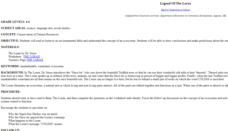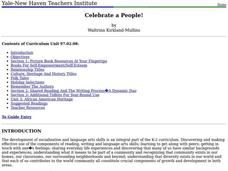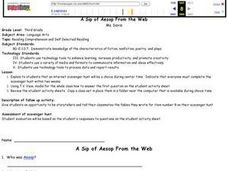Curated OER
Rhyming Words
In this rhyming words worksheet, 4th graders complete activities such as circling rhyming words, writing rhyming words, and more. Students complete 6 activities.
K5 Learning
Susie and Rover
Reinforce reading comprehension skills with a two-page worksheet offering a story about a young girl, her dog, and an important life lesson. Scholars read the text then show what they know through four short-answer questions.
Curated OER
Introduce: Summarizing Narrative Text
When scholars re-tell a story, do they boil it down to important details in a logical order? Practice summarizing narratives using this think-aloud strategy, which is scripted here for your convenience. After explaining why this is an...
Curated OER
Legend of The Lorax
Students explore ecosystems. They read or listen to Dr. Seuss' The Lorax to draw conclusions and make predictions about the environmental impact and use of resources. They write poems about real forests and the wildlife which inhabit...
Curated OER
Literary Terms
In this literary terms worksheet, students define and discuss ten literary terms associated with literature and complete a word search puzzle.
Curated OER
Drama: Learn A Lesson from the Lion
Reading is reading, whether it's for drama or English class. Boost reading fluency, accuracy, intonation, and comprehension while fostering creative acting skills. Kids read the provided tale of "The Lion and the Mouse" several times in...
School Specialty
The Tortoise and the Hare - Drawing Conclusions/Predictions Outcomes
Does the fastest one always win the race? Look deeper into The Tortoise and the Hare with a set of discussion questions for before, during, and after reading the story.
Polar Trec
Talk Story: A Native Way of Knowing
The steps of the scientific method examine a problem, make a prediction, and attempt to solve the problem—similar to the path most stories take. In the activity, individuals see how stories can explain natural events similar to the way...
Curated OER
Amos and Boris: Text Study
Twenty insightful questions follow a read aloud of the story, Amos and Boris by William Steig. Scholars then show what they know through completion of a cause and effect chart, reading fluency assessment, and a written...
Thoughtful Education Press
Compare and Contrast
Encourage readers to compare and contrast the information that they find in informational text with a variety of reading passages and worksheets. Learners read all about subjects in science, social studies, and literature...
Curated OER
As the Kids Come and Go: Mapping a Classroom
Map the classroom with your kids to help them understand how maps work and how to read them. The lesson starts off with a story about animals living and moving around the globe, and then kids create maps of their classroom to show how...
Syracuse City School District
Summary of Fiction and Non-Fiction Text
Somebody Wanted But So Then (SWBST)? Yes! Here's a great strategy for teaching young readers how to summarize narrative text. In addition, the packet includes exercises that show kids how to summarize nonfiction text using the classic...
Curated OER
Citizens for Responsible Change
Third graders write a petition to a school figure, get signatures from other students, share the petition with the appropriate authority, and then work as leaders to carry out the group's solution.
Curated OER
"Theseus and the Minotaur"
Young scholars analyze the features of myths and legends. They read the myths "Theseus and the Minotaur" and "Orpheus and Eurydice," identify the myth story elements, evaluate each story for the overall theme, describe the characters,...
Curated OER
Trouble With Trolls
Students listen to The Trouble With Trolls and discuss fables. In this story elements lesson, students work on reading skills. Students participate in different reading activities.
Curated OER
Tales From Around the World
Students read stories. In this culture lesson, students read stories from different regions around the world. Students look for each region on the map and listen for interesting cultural details in the story. Students then discuss the...
Curated OER
Transforming Fairy Tales
Students use the computer to write, draw, explore the Internet, and combine all of these elements. They write their own fairy tales, use computer software to create drawings of the characters for their tales and use the Internet to...
Curated OER
Amazing Animal Alliteration Book
Students understand the meaning of alliteration. For this alliteration lesson, students write sentences using alliteration and recognize how it changes the writing in a story.
Curated OER
Celebrate A People!
Students explore African-American students literature as an integral building block in empowering all students to a better awareness when reading and writing. They use as a productive Social Studies tool for overall understanding of the...
Curated OER
Scrapbook of Evidence
Students read three different genres of fiction. They create a story map and brainstorm possible collage inclusions. Each student prepares a minimum of two scrapbook page entries for each text or passage. Students write beside each...
Curated OER
Identifying the Theme in a Story
Middle schoolers recognize Theme through the use of simple, short stories. Using Pro Quest, students begin by researching the literary element, theme, and how it can be identified. They then identify the themes in Aesop's...
Pennsylvania Department of Education
Comparing Key Ideas and Details in Fiction and Nonfiction
Students recognize the differences between fiction and nonfiction texts. In this genre study lesson, students discuss what nonfiction means and write the definition. Students listen to a read aloud and vote whether the text is fiction or...
Curated OER
A Sip of Aesop From the Web
Third graders answer specific questions by conducting an Internet scavenger hunt. They write their own fable after reading many different fables on the Internet. They questions that they answer are included in this lesson.
K5 Learning
The Wolf
Fourth graders have likely heard the expression to cry wolf, but they may not know the saying's origin. A short reading passage tells the story and includes four comprehension questions for pupils to demonstrate their...
Other popular searches
- Writing Fables and Folktales
- Writing Fables Middle School
- Writing Fables 4th Grade
- Writing Fables Grade 6
- Writing Fables Mind Map
- Writing Fables Gr 5
- Writing Fables Rubric
- Writing Fables Gr 2
- Writing Fables Animal Farm
- Writing Fables Gr 3
- Aesop's Fables and Writing
- Fables Six Traits Writing

























